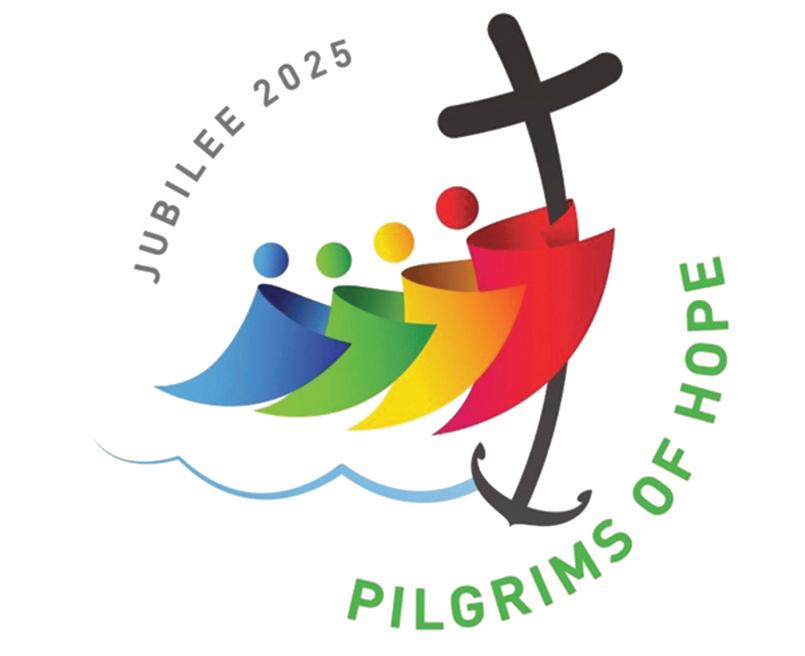

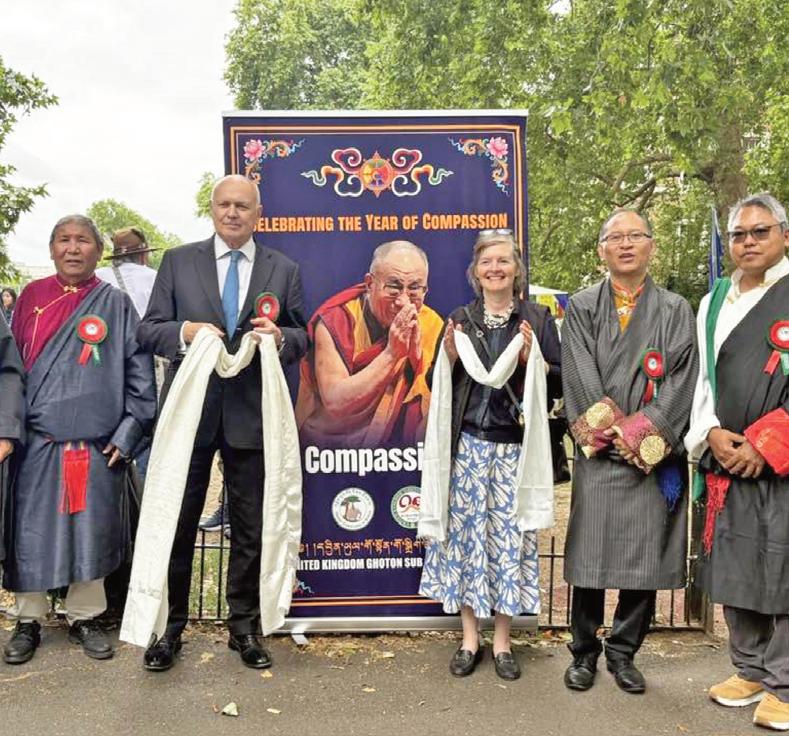
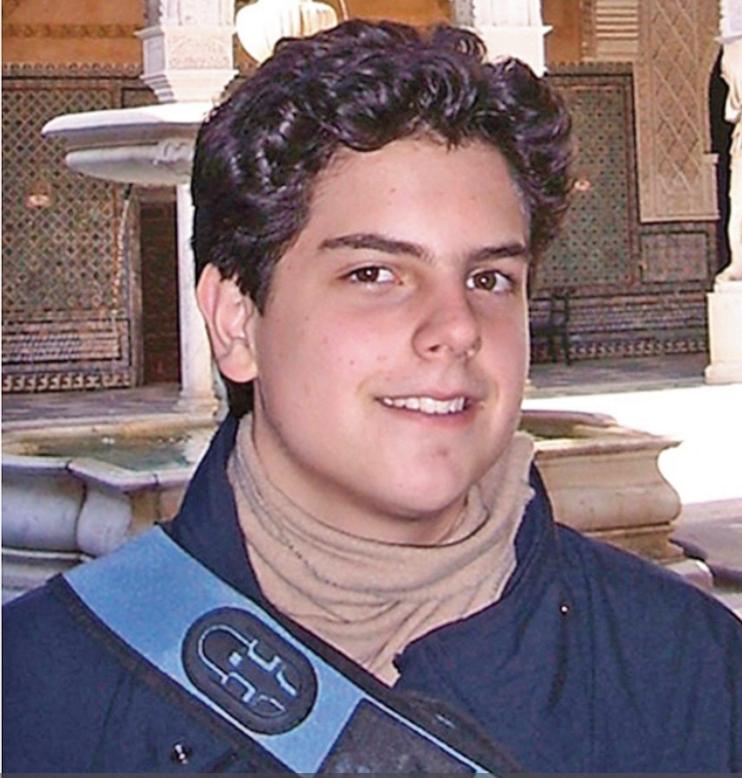
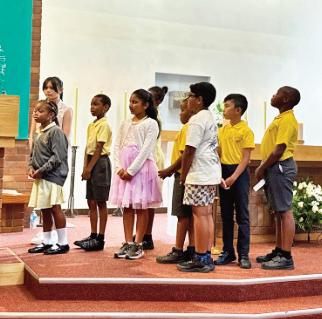
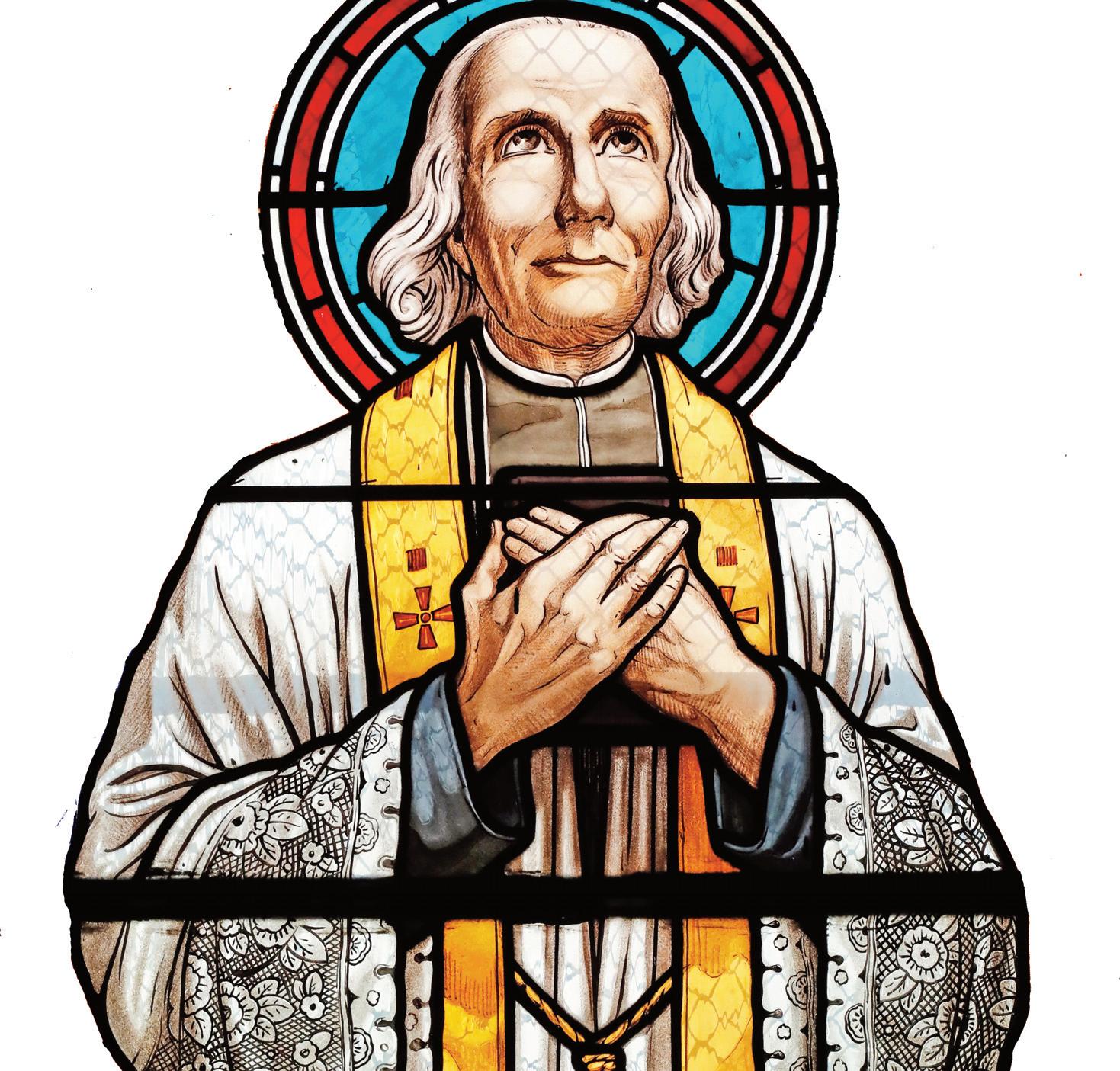









As we move into the summer months, many dioceses across the country will be embarking on pilgrimages. Throughout history and across the world, people have set out on journeys in search of something greater than themselves. The motivations are many and diverse – some want to develop their understanding of themselves and the world, some to deepen their faith or to heal.
For Catholics, a pilgrimage is a spiritual journey to a holy place. The most popular and sacred destinations are Lourdes (with an estimated 200 million visitors since 1860 when pilgrimages there began), Santiago de Compostela in northern Spain and of course, the Holy Land which the current fighting has made impossible to visit. Unlike a holiday, where relaxation and sightseeing might be the goal, a pilgrimage is about inner renewal. As the journey progresses, so does the soul’s transformation.
At its heart, a pilgrimage is an invitation to encounter God in a profound way. The effort required—planning, travelling, stepping outside your comfort zone—becomes part of the prayer. Along the way, pilgrims often find moments of quiet to reflect and listen, away from the noise of daily life. Many pilgrimages include the Sacraments: daily Mass, opportunities for Confession, and Eucharistic Adoration. Walking in the footsteps of saints or standing in places marked by Marian apparitions can awaken a deeper love for God and a renewed sense of faith.
Pilgrimage also reminds us that faith is not a solitary journey. Visiting shrines and cathedrals where generations have prayed creates a tangible connection to the Church’s history and to the Communion of Saints. Whether travelling alone, with family, or as part of a group, pilgrims experience a unique fellowship along the way. Sharing meals, prayers, and


stories fosters bonds that can last a lifetime. As one pilgrim said: “I left as a stranger and returned with a family.”
For many, pilgrimage is a response to a deep need for healing—physical, emotional, or spiritual. Sites such as Lourdes in France or Holywell in Wales have long been associated with miraculous cures and profound grace. Even when physical healing does not come, pilgrims often discover a peace that brings inner restoration. In surrendering burdens and intentions to God, they find a renewed sense of hope.
Pilgrimage is not always easy—and that is part of its power. It involves early mornings, unfamiliar places, and sometimes long, demanding walks. These challenges strip away comforts and distractions, creating space for God to work in the heart. Small sacrifices— giving up control of schedules, enduring
simple accommodation, or walking through rain—become acts of love and trust. In a world that prizes convenience, pilgrimage reminds us of the value of perseverance and humility.
Not every pilgrimage requires boarding a plane or walking hundreds of miles. Across the UK, there are countless opportunities for local pilgrimages. Historic shrines like Walsingham in Norfolk, the holy well of St Winefride in Wales, and Scotland’s Carfin Grotto attract thousands each year. A pilgrimage can be as simple as setting aside a day to visit a nearby church or cathedral with a prayerful heart. The essence of pilgrimage is not in the distance travelled but in the disposition of the heart—a willingness to seek God and allow Him to transform the journey.
If the idea of pilgrimage has ever moved you, perhaps now is the time to respond. Whether you are seeking healing, clarity, or a deeper
relationship with God, a pilgrimage offers the chance to step away from the ordinary and encounter the extraordinary. It is a reminder that the Christian life itself is a pilgrimage—a journey towards the ultimate destination: heaven.
So, where might God be calling you? To the quiet of Walsingham’s shrine, the healing waters of Holywell, or perhaps a Camino route through the rolling countryside? Wherever the path leads, the promise is the same: God walks with those who seek Him.
Scan the QR Code below for inspiration about where to go in the UK.



CONTACT US:
The Catholic Post is published by its owners CathCom Limited and is wholly independent of and separate from any previous newspaper.
The Catholic Post is published on the last Sunday of the month previous to publication date.
EDITOR:
Nick Layton
email: editor@catholicpost.co.uk
ADVERTISING:
Charlotte / CathCom Ltd. 01440 730399
charlotter@cathcom.org
DESIGN & LAYOUT:
David Lodge, davidl@cathcom.org
PUBLISHED BY:
CathCom Ltd. N2 Blois Meadow Business Centre, Blois Road, Steeple Bumpstead, Haverhill, Suffolk CB9 7BN 01440 730399
ARTICLES TO:
The Catholic Post
email: editor@catholicpost.co.uk or davidl@cathcom.org
Please send articles for publication by email, supplying any photos separate to the text We welcome contributions
Here are answers to some basic questions about writing for The Catholic Post How long should articles be?
Usually it seems to work out best if contributors simply say what they have to say and let us worry about finding a spot for it in the paper. What is the submission procedure?
Please send as a Word file attached to an e-mail. To submit articles for publication, send to editor@catholicpost.co.uk
Charts, graphs, and photos should be submitted as separate PDFs. Electronic photos should not be embedded or pasted into a Word document as this reduces their quality.
Photographs and Illustrations
Photographs and Illustrations should be supplied electronically as high resolution JPEG (*.JPG) files).
Photographs and illustrations should be sent in colour with a resolution of 300 dpi and a minimum size of 100 mm x 100 mm when printed (approx. 1200 pixels wide onscreen).
Computer print-outs are not acceptable. Screen captures are not ideal as they are usually not very high
Parental permission should be sought before submitting photographs of minors.
Source information -
DW = Diocesan Website.
ICN = Independent Catholic News
Views expressed in The Catholic Post are not necessarily those of the editor
Last date for copy is the LAST DAY of the month prior to publication.

Archbishop Mark travelled to Rome for the Solemnity of Saints Peter and Paul to receive the pallium from Pope Leo XIV for the Archdiocese of Cardiff-Menevia
Following Pope Francis’s creation of the united Archdiocese of Cardiff-Menevia in September 2024, Archbishop Mark received the pallium for the newly united diocese, whereas he had previously received it for Cardiff alone in June 2023. The Pope has restored the ancient tradition of personally conferring the pallium on new metropolitan archbishops, marking a return to practices established by Saint John Paul II in 1983. This significant liturgical change affects archbishops worldwide, including those serving the faithful in Wales and beyond.
The pallium, a white woollen band approximately three inches wide with strips hanging down the front and back, serves as more than ceremonial dress. This sacred vestment symbolises both the archbishop’s unity with the Pope and his pastoral responsibility to serve God’s people. Metropolitan archbishops wear the pallium when celebrating Mass within their ecclesiastical province, representing their
participation in the Pope’s supreme pastoral authority.
The ceremony took place during the Solemnity of Saints Peter and Paul on 29th June, when Pope Leo XIV blessed and bestowed the pallium on 48 new metropolitan archbishops, reviving a custom that Pope Francis had modified in 2015.
Under Pope Francis’s previous arrangement, new archbishops would travel to Rome for the blessing of the palliums but receive them privately after Mass. The actual conferral would then take place back in their home archdiocese, with the papal nuncio placing the pallium on the archbishop’s shoulders amongst his own faithful and neighbouring bishops.
This restoration to the earlier practice reflects Pope Leo XIV’s approach to certain liturgical traditions. The ceremony emphasises the
direct bond between the Pope and metropolitan archbishops, underlining their shared responsibility for the Church’s mission.
The feast of Saints Peter and Paul holds particular significance for this ceremony. Saint Peter, as the first Pope, and Saint Paul, the great missionary to the Gentiles, represent the twin pillars upon which the Church was built. Their martyrdom in Rome and their tireless evangelisation provide the perfect backdrop for conferring this symbol of pastoral authority.
The pallium itself carries deep historical roots, with its use traceable to the fourth century when Pope Marcus conferred it upon the Bishop of Ostia in 336. Traditionally made from the wool of lambs blessed by the Pope on the feast of Saint Agnes, the pallium connects each archbishop to centuries of Church tradition whilst emphasising his current pastoral responsibilities.
For the faithful of south and mid Wales and Herefordshire, such ceremonies remind us of our connection to the universal Church. The pallium represents not only the archbishop’s authority but also the unity that binds local Churches to Rome and to each other throughout the world.

leaders Lama Zangmo of Kagyu Samye Dzong and Reverend Bishop Mark Nicholson, the Chairperson of the Tibetan Community in Britain and the Representative of the Central Tibetan Administration, Tsering Yangkey, all of whom shared powerful words of solidarity and hope. A portrait of the Dalai Lama by Koo Stark was unveiled during the event.
Speaking on behalf of the British government, the UK Prime Minister's Special Envoy for Freedom of Religion or Belief, David Smith MP, said in a statement: "The 14th Dalai Lama, based in Dharamshala, India, is the spiritual religious leader of Tibetan Buddhism, as well as a Nobel Peace Prize Laureate, strong human rights advocate, and defender of FoRB for Tibetan Buddhists. And on 6 July he celebrates his 90th birthday, to which the UK express congratulations and well wishes."
In London on Saturday, a special reception was held at the historic St Ethelburga's Centre for Reconciliation and Peace, hosted by the Office of Tibet alongside our friends from International Tibet Network and Tibet Action Institute.
In attendance was Chris Law MP, former Presiding Officer of the Scottish Parliament and Co-Convener of Cross-Party Group for Tibet, Linda Fabiani, prominent religious
There were interfaith prayers, live performances, cultural displays and a vibrant atmosphere for the celebration of Dalai Lama's birthday in the Tibetan Peace Garden, next to Imperial War Museum - across the road from St George's Cathedral in Southwark.
Among those attending was the Mayor of Greenwich, Councillor Linda Bird and Sir Iain Duncan Smith, Catholic MP Chingford & Woodford Green, who wrote later on X: "I attended the celebrations of the Dalai Lama 90th birthday who has been in exile since the Chinese took over Tibet. 250,000 Tibetan men are in forced, slave labour, China is a brutal occupier of Tibet and Tibetans fear China will eventually name a rival successor to the Dalai Lama, bolstering Beijing's control over Tibet." Thousands of people from around the world travelled to Dharamshala, the small Indian town in the foothills of the Himalayas where the Dalai Lama lives, to mark his birthday.
On the Marian feast of 8th September 1914, the German Army was advancing on Paris. Inexplicably, it suddenly retreated, turning back.
It was reported that the Virgin Mary ‘pushed back’ the army of 100,000 soldiers, not letting them move further, whilst the troops were ordered ‘under pain of death’ not to speak of the apparition to anyone.
However, a letter addressed to the Carmel of Pontoise recounts that: ‘On 3 January 1915, a German priest, wounded and taken prisoner during the Battle of the Marne, died in a French ambulance where he was cared for by some nuns. He said to them: “As a soldier I should keep silent, but as a priest, I must say what I have seen. During the Battle of the Marne, we were surprised to be pushed into retreat, because our numbers were legion compared to the French, and we expected very soon to arrive in Paris. But we saw the Virgin Mary, dressed all in white, with a blue belt, leaning her head toward Paris. She turned her back to us, and with her right hand seemed to push us away…I saw her myself and a good number of my companions also”.’
About the same time, two German officers, also wounded and prisoners of war, were admitted into a French hospital run by the Red Cross. When they saw there a statue of Our Lady of Lourdes, a nurse, (who could speak German) heard them exclaim: “Die Frau von der Marne!” “Oh, the Virgin of the Marne!”
Describing himself as "a simple Buddhist monk" who doesn't normally celebrate his birthday, the Dalai Lama gave a short message appealing for peace and compassion, warmheartedness, and altruism in the world.
He said: "While it is important to work for material development, it is vital to focus on achieving peace of mind through cultivating a good heart and by being compassionate, not just toward near and dear ones, but toward everyone. Through this, you will contribute to making the world a better place.
As for myself, I will continue to focus on my commitments of promoting human values, religious harmony, drawing attention to the ancient Indian wisdom which explains the workings of mind and emotions, and Tibetan culture and heritage, which has so much potential to contribute to the world through its emphasis on peace of mind and compassion."
While the Chinese government has stated that it plans to appoint the Dalai Lama's successor, he has now confirmed in a message that only the Office of the Dalai Lama - in consultation with heads of Buddhist traditions and the reliable oath-bound Dharma Protectors has the responsibility for identifying and recognising future Dalai Lama reincarnations.
France was devoted to the Holy Rosary and the bishop of Meaux had promised to set up a shrine to Our Lady if she should protect Paris.
Our Lady hears our prayers. Pray the Rosary and trust in her.
www.crownofthorns.org.uk email: office@crownofthorns.org.uk
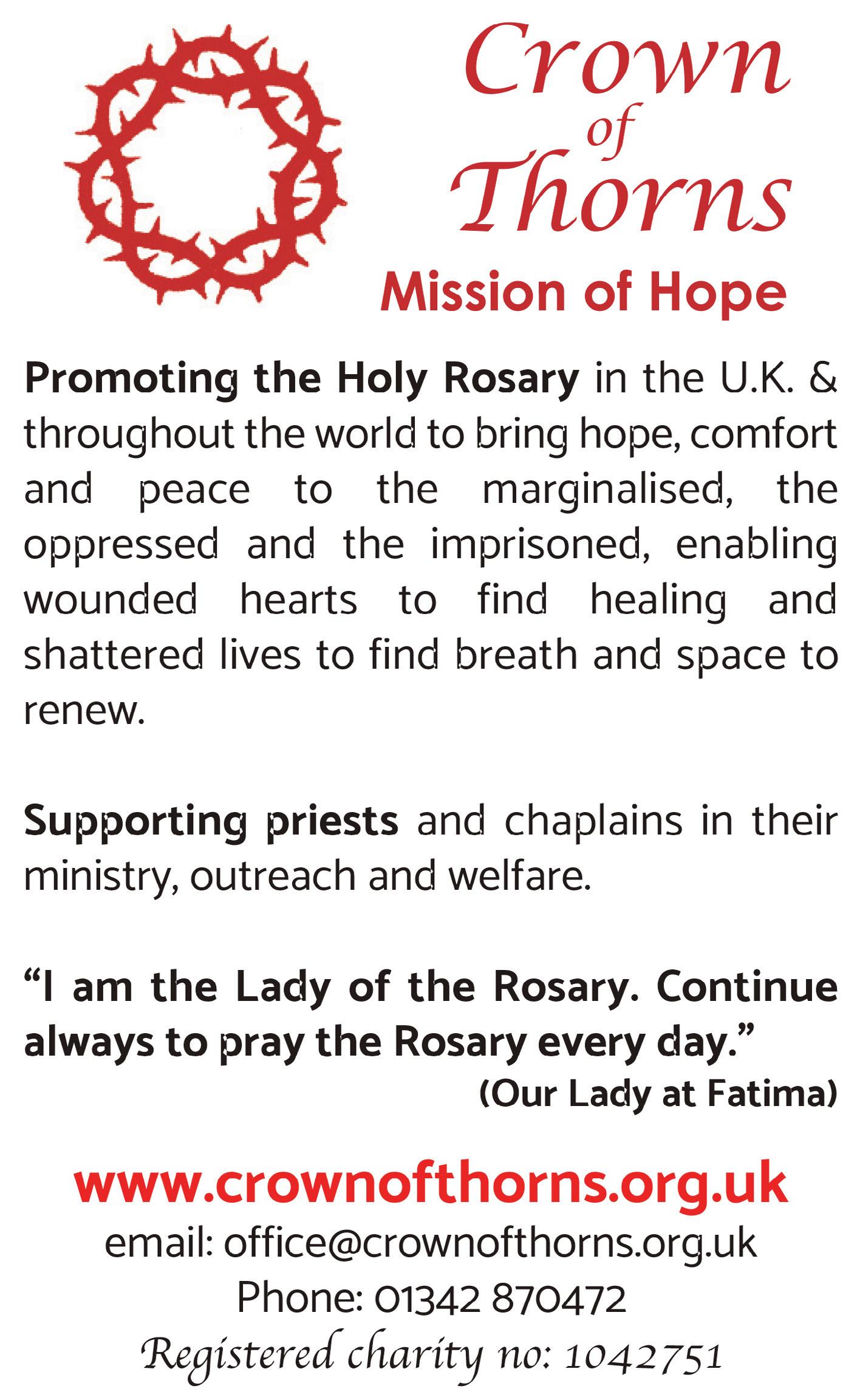

Children and staff at St Francis School in Nailsea came together this week to take part in a heart-warming and visually spectacular “Cereal Box Domino Challenge,” an initiative organized as part of the school’s ongoing Year of Hope activities.
More than 200 cereal boxes were carefully arranged in the shape of a heart and toppled in a domino-style display, drawing cheers and smiles from all who watched. The creative and engaging challenge wasn’t just for fun—it carried a powerful message of community spirit and giving back.
Once the domino challenge was complete, all donated cereal boxes were collected and prepared for delivery to the local foodbank, where they will help support families in need.
“This event brought everyone together for a great cause,” said one teacher. “It was a fun way to show how small contributions can create a big impact.”
The Year of Hope continues to inspire acts of kindness, and the success of the cereal box challenge is yet another example of how the children at St Francis’ are turning hope into action. cliftondiocese.com





dioceseofbrentwood.net
Catholic school organisers met Pope Leo XIV, celebrating community organising and Catholic Social Teaching in action
In a remarkable affirmation of faith-inspired civic engagement, a delegation from Citizens UK including various Catholic school community organisers, were welcomed at the Vatican by His Holiness Pope Leo XIV during the General Audience on Wednesday, 25 June 2025.
The visit marks a significant moment in the journey of an initiative around Called to Action, a toolkit launched in 2024 to support Catholic schools and colleges in living out the principles of Catholic Social Teaching through community organising. The toolkit, developed by Citizens UK in partnership with Catholic school organisers from member institutions, aims to place the dignity of the human person, solidarity, and the common good at the heart of Catholic education in a practical and livedout sense.
The journey to this meeting began 18 months ago, when the organisers started planning the initial conference and toolkit launch. The group decided to approach Cardinal Vincent Nichols, Archbishop of Westminster, who was attending, with an ‘ask’. It was a hope and dream to establish a dialogue with the Holy Father.
Student organisers at the launch asked Cardinal Nichols to hand-deliver a letter to Pope Francis. The Cardinal agreed and personally delivered the request to the Vatican in summer 2024. An invite from the Pope arrived in early 2025.
Following the death of Pope Francis and the election of Pope Leo XIV earlier this year, the delegation were pleased to hear their invitation was still valid. A letter was sent explaining Citizens UK work in Catholic schools, which was delivered by diplomatic channels via the Apostolic Nunciature.
To the delegation’s great joy, their presence was acknowledged during the General

Audience, where Pope Leo XIV offered “special greetings to the members of Citizens UK Catholic movement”. The organisers were later able to present the Pope with a copy of Called to Action and other symbolic gifts from the schools. His Holiness graciously signed photographs and items, which will now be displayed in the schools as a reminder of the visit.
Pope Leo was also presented with a copy of Not Only with Words, a report which tells the story of parishes in Citizens UK who have also been community organising to live out the Church’s teaching on social justice and Synodality. The report, produced by the Centre for Theology and Community, includes a foreword by Cardinal Nichols encouraging more Catholic parishes to engage in this work.
Andy Lewis, one of the organisers and deputy headteacher at St Bonaventure’s, East London said: “This meeting is a powerful endorsement of our work in Catholic schools. To hear our actions affirmed at the highest level of the Church was deeply moving and a testament to what is possible when Catholic Social Teaching is not only taught, but lived. It was a day we will never forget.”
The delegation included young organisers and staff from St Antony’s Primary School, St Bonaventure’s (both East London), St Thomas More Catholic High School (North Tyneside), Cardinal Newman College (Brighton), Greyfriars Catholic School (Oxford), and Wimbledon College (Merton).
The group’s time in Rome also included visits to significant Catholic churches and basilicas, including the tomb of Pope Francis. It made the pilgrimage a spiritually rich and memorable experience for the group, as true pilgrims in the Jubilee Year. The days were termed a ‘Summit of Hope’ as organisers met and shared stories and ideas.
Thomas, a student from Wimbledon College, said: “Pope Leo had a kind smile for everyone. Never in my wildest dreams did I think I’d take part in anything like this. It’s really strengthened my faith and desire to share that loving kindness with others.”
Lily, a student from St Thomas More Catholic High School, agreed: “It was a faith-enriching, once-in-a-lifetime event that I will never forget.”
And St Antony’s Primary School student Ariana commented: “It was awe-inspiring and it encourages me to have a stronger relationship with God and with others… we are one community no matter where in the world we are.”
This moment signals a renewed energy and commitment to embedding the principles of

Catholic Social Teaching and community organising and leadership in Catholic schools across England and Wales with the support of Citizens UK. Planning is already underway to
expand the Called to Action programme, with a growing network of schools and dioceses expressing interest, and a follow up conference is scheduled for 2026.
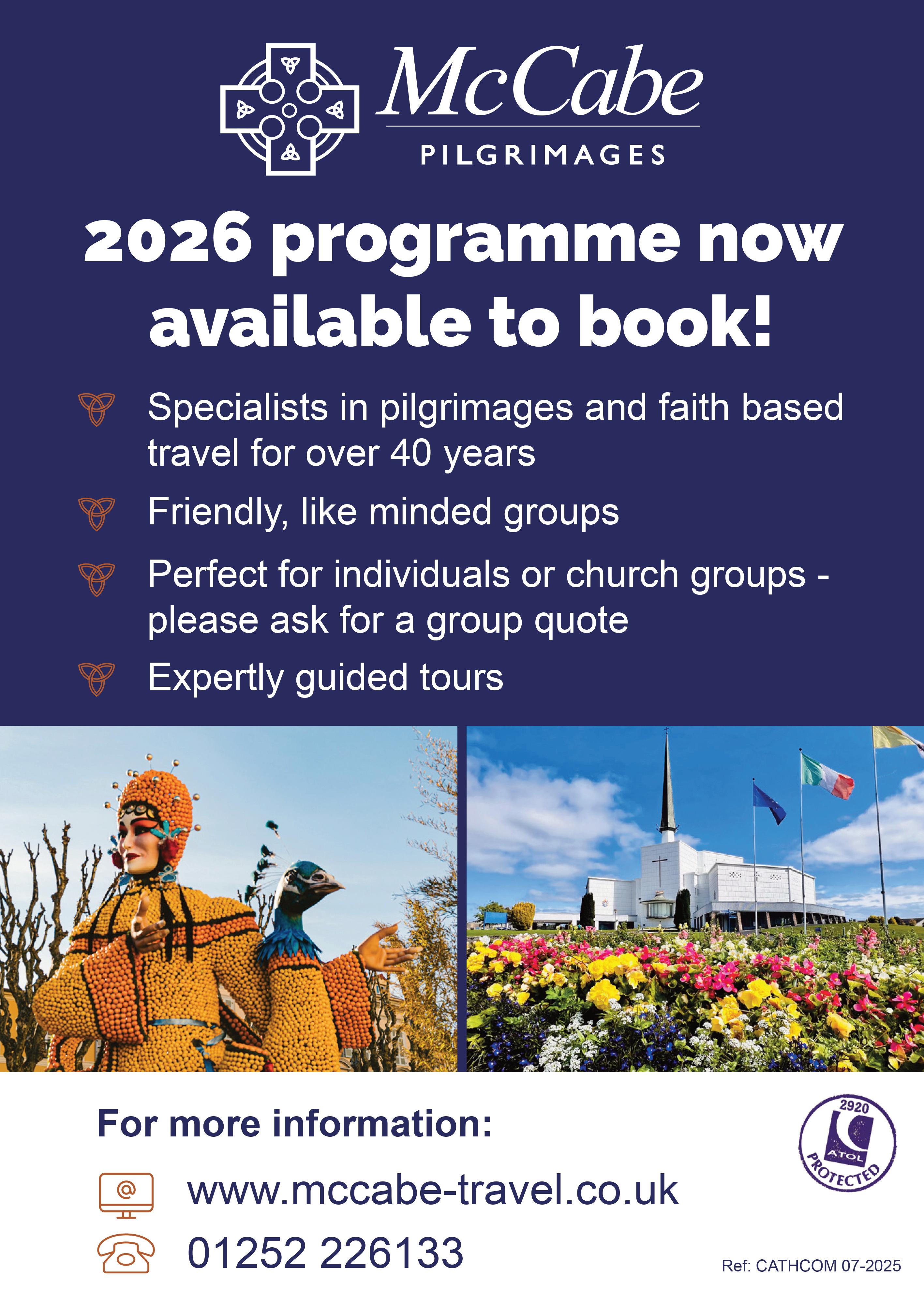

Faith groups joined a mass lobby of parliament on climate change and biodiversity, on Thursday 9 July. Calling for action 'For People, For Climate, For Nature' they met their local MPs from across the UK, urging them to tackle the climate crisis and protect the natural world in line with moral responsibility, human dignity and the stewardship of creation.
They wanted the government to commit to delivering funds to communities hit hardest by climate change in the UK and around the world, to restore nature and to back UK jobs for a greener, fairer future. Many raised the issue of UK Government preparations for November's UN COP30 climate summit in Brazil.
The lobby was organised by The Climate Coalition, which represents more than 120 leading UK organisations, secular and faith based. It includes CAFOD, Christian Aid, Tearfund, Operations Noah and Green Christian. More than 5,000 people from across the UK attended and it was thought at least 500 MPs were lobbied, about 80% of the total.
CAFOD's chief executive, Christine Allen, was there and said: “This mass lobby is a key moment during the Jubilee Year to speak out and demand change. The UK must lead bold global reforms to cancel unjust debt and unlock funds to fight a crisis these countries did least to cause. This is about justice, and urgent action."
Campaigners gathered in sun-drenched Parliament Square for photos wearing colourful t-shirts, holding up artwork, flags, signs and banners reading: "Act Now, Change Forever.' CAFOD groups held up the banner, "We are pilgrims of Hope.' Laudato Si Animators displayed, 'Laudato Si Movement.' A grandparents group called Our
Grandchildren's Climate, were in the crowd to campaign for pensions to divest away from fossil fuels. Around 50 people attended a Christian Climate Action prayerful vigil outside the gates of Parliament.
In the late afternoon, groups from Catholic schools gathered at Westminster Cathedral Hall for activities organised by CAFOD. Over a hundred school children attended the lobby and they were enthused by meeting MPs, collecting badges from stalls of the organising charities, and contributing towards the struggle for justice and for poor communities and the environment.
In a collaborative programme between the Columban Justice, Peace and Ecology Teamled by James Trewby - and the London FCJ Centre for Spirituality and Ecojustice - led by Sr MaryAnne Francalanza - five schools in Birmingham Archdiocese and one in Liverpool Archdiocese sent delegates to the lobby. They were Bishop Ullathorne and Cardinal Newman in Coventry, Archbishop Illsley and St Thomas Aquinas in Birmingham, St Peters in Solihull and Bellerive in Liverpool. "What a privilege to support young adults from Catholic schools to raise their voices, said James Trewby; "I was so impressed with the way they put Catholic Social Teaching into action - sharing concern not only for their own futures, but also for biodiversity and people around the world."
Two students from Cardinal Newman School in Coventry described the lobby as "really exciting" and tied in with work they do locally such as tree planting. They would be writing a report for their school's newsletter. Their chaplain, Alfie McMillan, reported that the children spoke confidently with MPs about the issues, having a good base knowledge of Catholic Social Teaching, experience of participation in the school's eco-groups, and

Lobby groups outside QE2 Centre
education work with CAFOD. St Oscar Romero School in Worthing also had pupils and staff joining in activities in the hall. This school has five action groups which promote sustainability, including tackling climate change.
Catholic groups came together for a 5.30pm Mass at Westminster Cathedral celebrated by Bishop John Arnold of Salford, lead bishop on the Environment for England and Wales. He reminded that in the encyclical 'Laudato Si', Pope Francis spoke of the need to care for God's creation and said, "Pope Leo is following the same vision." Concelebrants included Salesian Fr Marton Poulsom, a Board member of Operation Noah, Fr Michael Fitzsimons of Liverpool Archdiocese, a long-standing CAFOD campaigner, and Fr Charles Chilufya SJ a CAFOD partner from Kenya, who delivered the homily to a congregation where many wore CAFOD t-shirts and lobby wristbands.
Fr Charles - who has spoken to UN, G20, and IMF/World Bank meetings, advocating for debt relief, climate justice, and economic systems that serve people over profit - said, "we are breaking bread together at the end of a remarkable day which demonstrated our shared humanity." He reminded that the lobby
was in a long tradition of Church campaigning for justice, listening to 'the cry of the Earth and the cry of the Poor'. He recalled the Jubilee Debt campaign at the millennium and the Make Poverty History march in Edinburgh in 2005, where Church leaders publicly demonstrated "leadership rooted in love and compassion." He urged the congregation to continue this mission and "be fired" to support the vulnerable "with healing in our hands and justice in our voices."
Prime Minister Keir Starmer sent a message to those lobbying their MPs, saying: "The issues you are discussing today are central to my commitment to tackling climate change, both here in the UK and around the world."
The same day, Pope Leo XIV celebrated the first Mass for the Care of Creation at the Laudato Si' Village in Castel Gandolfo, near Rome, and urged Christians to embrace the mission to bring peace and reconciliation to our world and all creation. He said, "we must also pray for the conversion of many people, both inside and outside the Church, who still do not recognize the urgency of caring for our common home."
Ellen Teague
Pope Leo XIV presided at an Ordinary Public Consistory for the Vote on Causes for Canonisation, which gave formal approval for the canonisations of eight Blesseds, and set the date for their canonisations.
During the ceremony, the Holy Father announced that Blessed Pier Giorgio Frassati and Blessed Carlo Acutis will be canonised together on 7 September.
The canonisations of the two young saints— one from the early twentieth century, the other the first twenty-first-century saint—have been greatly anticipated due to the great devotion among the faithful.
Announcement by Pope Francis

The late Pope himself had announced the canonisations of Blesseds Pier Giorgio and Carlo at the General Audience of 20 November 2024, prompting thunderous applause from the crowds gathered in St. Peter’s Square.

The postponement of Blessed Carlo’s canonisation was announced on the day of Pope Francis’ death, 21 April, and it was widely assumed that Blessed Pier Giorgio’s canonisation would similarly be delayed.
Doubts about the timing of the canonisations were finally resolved with the announcement by Pope Leo, who has made the choice to enroll among the number of the saints two young men from different eras who led completely different lives, but who are nonetheless united in their love for Christ and their ability to impart that love to those whose lives they touched.
Seven blessed to be canonised in October
Pope Leo also set the date for the canonisation of seven other Blesseds, including martyred Armenian Catholic Archbishop Ignatius Shoukrallah Maloyan, who died in 1915 during the Armenian Genocide in the Ottoman Empire; and Peter To Rot, a lay catechist who was martyred in 1945 for continuing his apostolate despite the ban imposed by the Japanese. Blessed Peter will be the first canonized saint from Papua New Guinea.



Finally, two other


José Gregorio Hernández Cisneros, a Venezuelan doctor and member of the Secular Franciscan Order, known as “the doctor of the poor” because he treated those in need and even paid for their medicines.
By Salvatore
the culmination of the Jubilee for Youth.












Simon John, 79, continues Lourdes pilgrimage by bike to raise awareness
and funds against modern slavery
Simon John, aged 79, is resuming his remarkable pilgrimage cycle ride to Lourdes — picking up the journey exactly where it was interrupted two years ago when he was struck by a bus in France.
Simon originally set out in 2023 to cycle the 1,371 kilometres between the Marian shrines of Walsingham and Lourdes, raising awareness and funds to help combat the scourge of modern slavery. His efforts were tragically cut short near Chartres on 4 July 2023, when he was knocked over by a bus while cycling alone.
At first, his injuries seemed minor, and he bravely continued for another 60 miles before his condition deteriorated. Simon was eventually admitted to hospital in Blois, where he was diagnosed with a severe pulmonary embolism (PE) caused by a blood clot that had formed unnoticed in his leg. Doctors advised him not to cycle or lift anything for the foreseeable future.
Reflecting at the time from his hospital bed, Simon said:“This is a little frustrating, but at the dioceseofbrentwood.net
same time I have had two lucky escapes because either the bus or the PE could’ve killed me.”
Undeterred by this near-fatal incident, Simon has now recovered sufficiently to complete the pilgrimage he began in faith. He will restart his ride from the hospital in Blois where he was treated, and cycle the remaining distance to Lourdes.
Simon is dedicating his fundraising efforts to Caritas Bakhita House — a safe refuge for women escaping modern slavery and human trafficking, operated by the Diocese of Westminster. Since opening in 2015, Bakhita House has provided sanctuary, therapy and practical support to over 170 women and 13 new-born babies, helping them to begin the long journey of recovery and to rediscover their dignity.
Simon shared: “I believe that everyone deserves to live a life free from exploitation. My hope and prayer remain the same: that this small act can help raise awareness and inspire people to support the fight against modern slavery.”
The global crisis of human trafficking and forced labour is growing at an alarming rate, with an estimated 49.6 million people currently enslaved — one in every 150 people. Pope Francis called this exploitation “a scourge upon the body of Christ”.
Jean-Baptiste-Marie Vianney, later known as St John Vianney, was born on 8 May 1786 in Dardilly, France, the fourth of six children in a devout Catholic family known for charity. Growing up during the French Revolution, when priests faced persecution, he admired their courage and secretly received catechism instruction from displaced nuns. He made his First Communion at 13 in secrecy and later pursued education in Écully, though he struggled with studies disrupted by the Revolution, especially Latin. In 1809, while training for the priesthood, Vianney was drafted into Napoleon’s army due to a change in exemptions. After falling ill, he deserted and lived in hiding for over a year, teaching village children under the name Jerome Vincent, until an amnesty in 1810 allowed his return to seminary. Ordained in 1815, he became assistant priest in Écully before being appointed parish priest of Ars in 1818.

Simon welcomes sponsorship and support for his ride. Donations can be made online to Caritas Bakhita House at: www.caritaswestminster.org.uk/bakhita-house/donate/
Finding widespread religious ignorance and indifference in Ars, Vianney dedicated himself to catechesis, preaching against sin, and especially hearing confessions, often for 12–16 hours a day. His deep holiness and pastoral zeal transformed the parish, and by 1827 thousands of pilgrims began travelling to Ars; within decades, he attracted up to 20,000 annually. He founded La Providence, a home for girls, and showed great devotion to St Philomena, crediting her with his miraculous recovery from illness.
Despite attempts to join monastic life, Vianney remained in Ars until his death in 1859, revered as a humble, tireless shepherd and champion of the poor. Canonised in 1925 by Pope Pius XI, he is now the patron saint of parish priests. His feast day is celebrated on 4 August. He once said: “Private prayer is like straw scattered here and there... public prayer is like a mighty fire, rising like a column into the sky.”

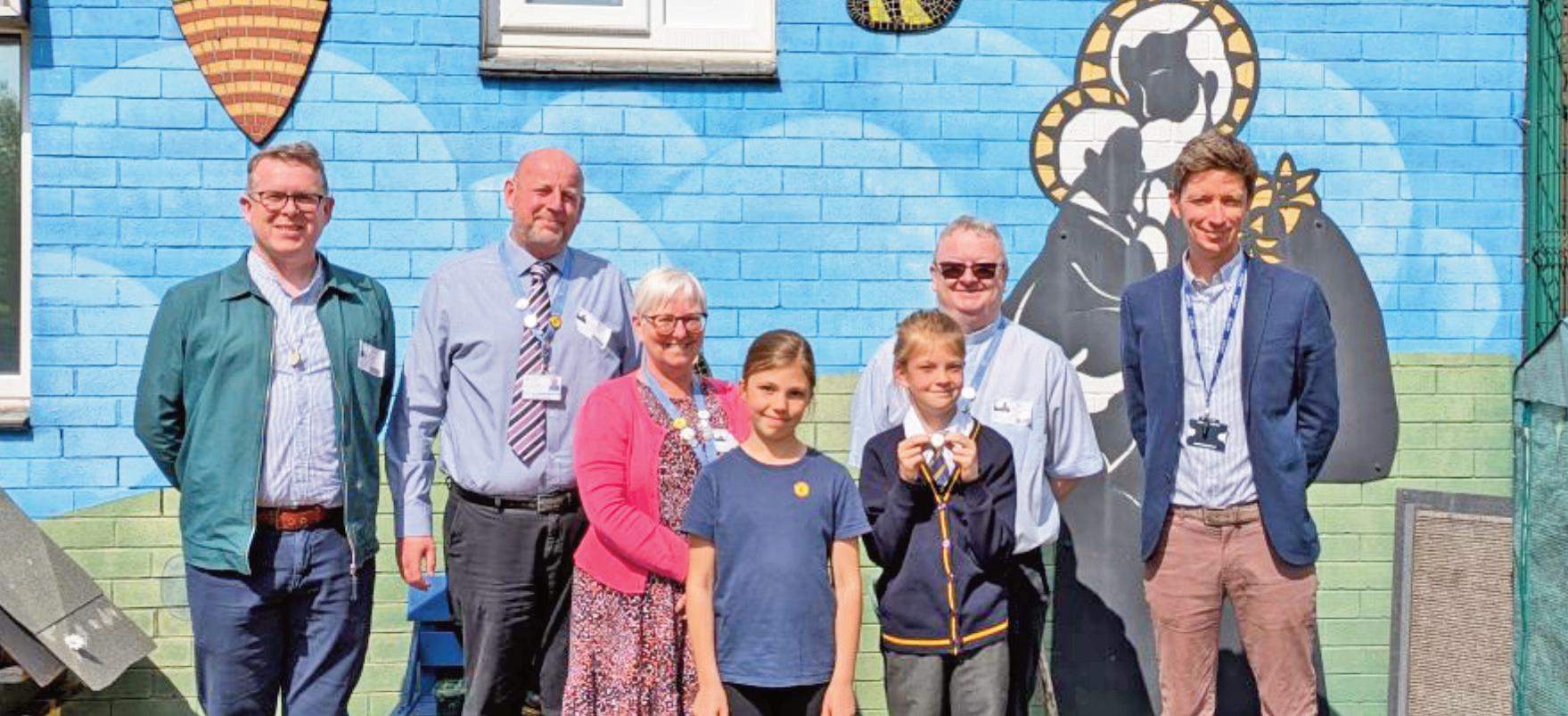
liverpoolcatholic.org.uk
Following the success of last year’s initiative, the archdiocese once again invited children preparing for their First Holy Communion to take part in a special pin badge design competition
The winning design will be professionally produced and distributed to over 6,000 children making their First Holy Communion across the archdiocese this year.
This year’s winner is Jessica Caulfield, aged 8, from St Joseph’s Catholic Primary School in Leigh — remarkably, the same school that produced last year’s winner, Michelina.
Jessica’s thoughtful and symbolic design stood out for its creativity and its message of faith and hope. “The gold is to represent strength in faith,” Jessica wrote. “I wanted to include the Jubilee Year theme of Hope to remind us.”
At a special school assembly earlier this month, Rev Canon Michael Fitzsimons, Episcopal Vicar for Education, visited St


Joseph’s to celebrate the children’s faith journey and speak to them about their First Holy Communion.
He, together with some of the competition judges, also presented Jessica with a set of art supplies in recognition of her winning design.
Headteacher Mr Richardson said, “We’re thrilled that one of our pupils has won this wonderful competition for the second year in a row. It’s a real testament to the children’s understanding of their faith and the enthusiasm they bring to their preparation. We’re very proud of Jessica and of all our First Holy Communion children.”
Congratulations to Jessica, and all who entered!











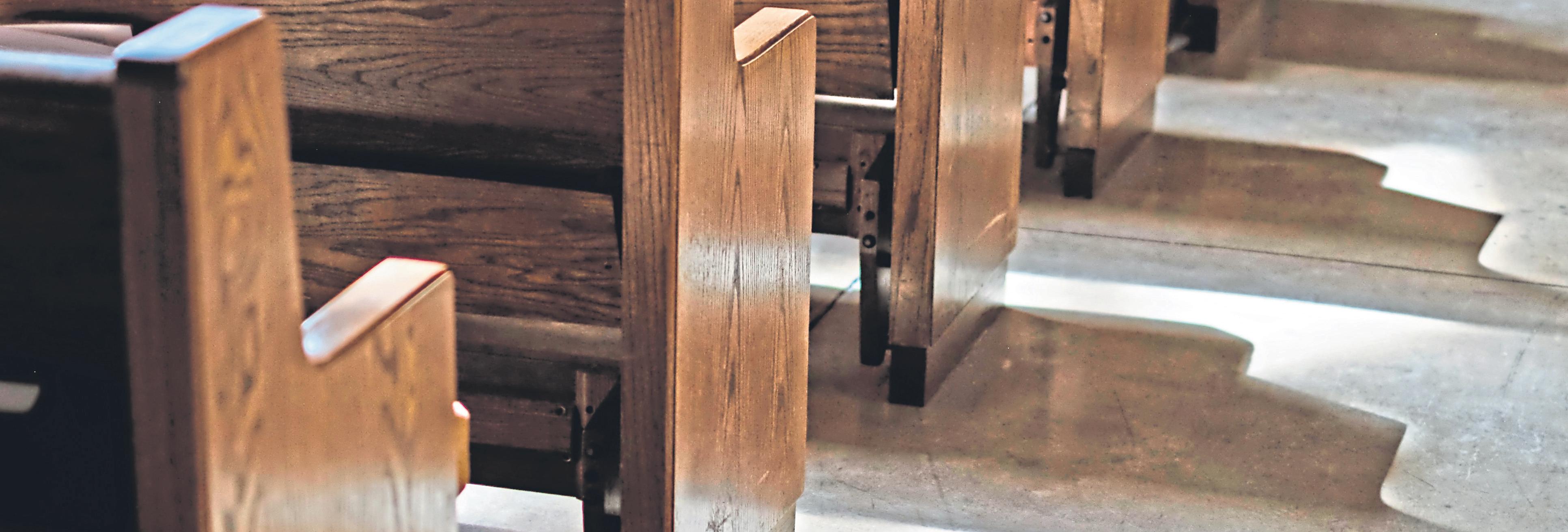


Dr Jay Kettle-Williams
Caveat emptor (Lat. ‘Buyer beware’) are words of caution often bandied to and fro by way of alerting those exercising their free will to purchase. But, generally speaking, how free are we to exercise our will? The question can touch on many an area of social intercourse including that of religion.
Animal rights prevent me from throwing a cat amongst the pigeons, so let me gently place a feline among avians and ask: If God is omnipotent, He knows everything, including what I’m going to do. So how can I have free will?






Here is our exchange:
Q: How has Christianity benefitted human civilisation?
A: Christianity has had a profound and farreaching influence on human civilisation, particularly in shaping the moral, cultural, and institutional foundations of the Western world. Here are some of the key ways it has contributed:
1. Moral and ethical frameworks: Christian teachings—especially those emphasizing love, compassion, forgiveness, and the inherent dignity of every person—have deeply influenced Western moral thought. Concepts like agape (selfless love) helped shape ideas of charity, justice, and human rights.























Well, that question was so ably addressed by a priest some years ago that his answer has ever remained with me: ‘We only ever have free will within clearly defined parameters,’ he explained, ‘and within those parameters we are free to act, to develop’. To my mind that’s pretty much the human condition in a nutshell. We have that God-given potential to act within human dimensions and to develop at will, as we see fit within a given scenario. There’ll probably be a parable to that effect somewhere.
But what if our free will is taken, surrendered or given away?
An interesting study has been carried out by academics at the Massachusetts Institute of Technology in Cambridge, USA (https://www.mit.edu) in which reduced brain activity was detected in students who used AI (Artificial Intelligence) tools for help with writing essays. The suggestion is that using AI (Artificial Intelligence) tools such as ChatGPT may hurt your long-term ability to think, learn and remember.

The research, using electroencephalogram scans (EEGs), which measure electrical activity in the brain, tracked students who used large language models (LLMs) to help to them write essays. It revealed that the students registered reduced brain activity, poorer memory and weaker engagement than those who wrote essays using other methods.
So I decided to reduce my brain activity, to decommission my memory, to otherwise disengage from the fuller freedom of expression, of composition and to put a question to Copilot, an AI-powered tool.
2. Education and literacy: Monasteries and cathedral schools were among the earliest centers of learning in medieval Europe. Over time, this evolved into the university system, with institutions like Oxford and Paris founded under Christian auspices. Missionaries also promoted literacy to help people read the Bible.
3. Healthcare and social welfare: The Christian emphasis on caring for the sick and poor led to the establishment of hospitals and charitable institutions. By the 4th century, it was common for churches to be built alongside hospitals, a tradition that continues today in many faith-based healthcare systems.
4. Abolition and social justice movements: Christian convictions played a central role in movements to abolish slavery, promote civil rights, and advocate for the poor and marginalized. Figures like William Wilberforce in the UK and Martin Luther King Jr. in the US were driven by their Christian faith.
5. Art, music, and architecture: Christianity inspired some of the world’s most iconic art and architecture—from Gothic cathedrals to Renaissance masterpieces. Sacred music, from Gregorian chant to Bach’s compositions, also flourished under Christian patronage.
6. Legal and political thought: Christian ideas about the sanctity of life, justice, and the moral responsibility of rulers helped shape Western legal systems. The notion of individual rights and the separation of church and state both have roots in Christian theological debates.
Of course, Christianity’s legacy is complex and not without controversy, but its contributions to civilisation - especially in fostering compassion, learning, and social reform - are undeniably significant. Would you like to explore how these influences compare with those of other major world religions? Or

perhaps dive deeper into one of these areas? Interesting! But that then left me in a quandary: If I condemn AI, am I nothing but a latter-day Luddite? If I embrace AI, such as Copilot’s answer above, am I surrendering my creativity, my humanity and so dehumanising myself?
I turned to a recent article in The Times (June 2025) by Ann Francke, chief executive of the Chartered Management Institute. She wrote about engaging with AI to best effect. I quote: ‘The best managers encourage people to use technology to enhance their productivity. But there need to be safety rails. I call this “freedom within a framework”’. Now, where have I heard something like that before?
Acknowledgements and Attribution: Accompanying image (Statue with Blowing Horn) after the sculpture Exultate Jubilate by Philip Jackson.Texts/References adapted and/or adopted from http://en.wikipedia.org under the terms of the Creative Commons Attribution-ShareAlike License 4.0: http://creativecommons.org/licenses/bysa/4.0/; Photograph (Unsplash): Replaced by robot? by Andrea Da Santis.

During a Mass celebrated on Nottingham Diocese’s annual Family Fun Day, Bishop Patrick McKinney also urged parents not to feel defeated when they spend much of the Mass distracted by their children, and praised parents for persisting with bringing their children to Mass.
“It's here in the Eucharist that you all receive the graces from God to live out well your vocation of marriage and family,” Bishop Patrick explained, in his homily delivered on Saturday June 21st at Our Lady of Lourdes Church in Mickleover.
He continued: “But I'm not naive! I'm very aware that the very process of getting to Mass with young children can be a challenge for many families. It's not just the getting them up, fed, washed and dressed, and out for Mass. But having got them to Mass, I realise that for many of you with very young children, so much of your time in Mass can be spent looking after them or chasing around after them when they break free.
“I can understand that you may sometimes be tempted to think, what's the point of making the effort, it's a lot of hard work; I'm permanently distracted; does the Lord even appreciate what we put ourselves through to get the family and ourselves here?”
Bishop Patrick, went on: “In response, I want to say to you as parents today, Christ Jesus is delighted that you make the effort to bring

your children to Mass. He knows the personal cost to you, and He delights in your efforts to help your children become familiar with Mass and their parish community.”
The Mass was attended by approximately 230 people, including a multitude of families from across the diocese, with children of all ages.
The parish’s recently established children’s choir, also praised God with beautiful Gregorian Chant, throughout the Mass.
During his homily, the Bishop also emphasised that priests and parishioners should be welcoming of young families, who are vital to the life of the parish.
“The clergy and parish members gathered with you for Mass should also be delighted that you have brought your young children because,
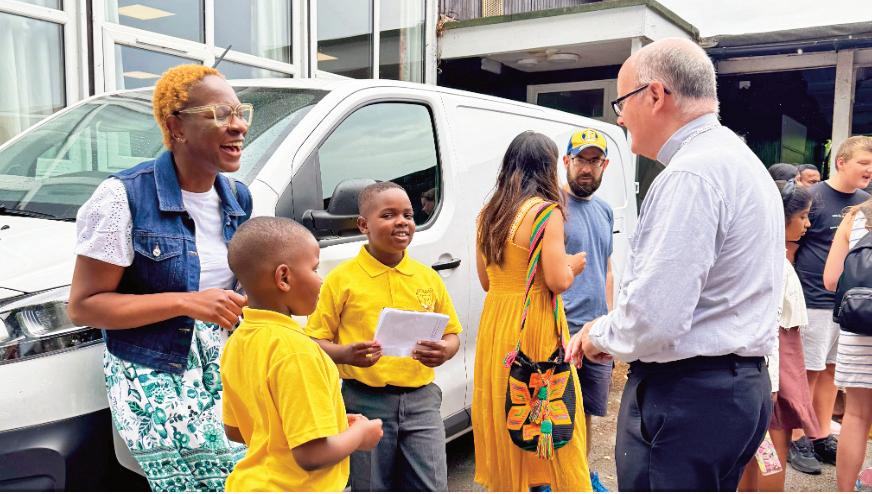

without the involvement, excitement and noise of young children, a parish can quickly become an impoverished community, a parish possibly without a future,” he explained.
“As families with children, and with young people of varying ages, you all have a prominent role to play in keeping parishes alive and sensitive to the varying needs of those who gather for Mass and who are very much part of its community. Nobody should be made to feel uncomfortable at Mass.”
Following the Mass dedicated to families, Bishop Patrick led a Eucharistic procession through the streets of Mickleover in the warm summer rain, with families and clergy processing behind and the children’s choir leading the Tantum Ergo.
Builders stopped their work, to observe the sight of the Blessed Sacrament sheltering under a processional canopy, with hundreds of people following in adoration.
After the procession, families, clergy and Bishop McKinney celebrated with a Hog Roast and the children then enjoyed games and made rosaries, thanks to the efforts of the diocesan youth team, who are based at The Briars Retreat Centre in Matlock.
Joe Hopkins, Director of Adult Formation for Mission and organiser of the Diocesan Family Fun Day said that the day was a huge success.
"It was a great boost for families to hear such encouraging words from their Bishop and to be reminded that they are invaluable to the life of their parishes," he said.



Ahead of the Jubilee Year celebration of World Day for Grandparents and the Elderly - which this year falls on July 27 - Pope Leo writes that "hope is a constant source of joy, whatever our age", adding, "when that hope has also been tempered by fire over the course of a long life, it proves a source of deep happiness."
In his Message for the Day, Pope Leo offers a scriptural meditation on old age, beginning with biblical figures such as Abraham and Sarah, Zechariah and Elizabeth, as well as Moses, all of whom were called in old age to be part of God's saving plan.
"The Jubilee we are now celebrating helps us to realize that hope is a constant source of joy, whatever our age. When that hope has also been tempered by fire over the course of a long life, it proves a source of deep happiness."
The history of salvation recounted in Scripture shows that, in God's eyes, "old age is a time of blessing and grace, and that the elderly are… the first witnesses of hope." Seeing the life of the Church and the world as the passing of generations, Pope Leo says the elderly, even if they need the support of the young, can serve as a witness to the inexperience of youth, helping them "to build the future with wisdom".
The "precious legacy" of the elderly as examples of faith, devotion, civic virtue, social commitment, and more, the Pope says, will always be "a source of gratitude and a summons to perseverance."
"God thus teaches us that, in his eyes, old age is a time of blessing and grace, and that the elderly are, for him, the first witnesses of hope."
At the same time, Pope Leo says the elderly also need hope. Recalling that the Jubilee is traditionally understood as a time of liberation, he says all are called to help the elderly "experience liberation, especially from loneliness and abandonment".
Too often in modern society, the Pope says, the elderly can become marginalized and forgotten. "Given this situation," he explains, "a change of pace is needed that would be readily seen in an assumption of responsibility on the part of the whole Church.
Every parish, he insists is called to support the elderly, "forging relationships that restore hope and dignity to those who feel forgotten". Especially with regard to the elderly, Christian hope "urges us to work for a change that can restore the esteem and affection to which [they] are entitled".
In particular, he recalls Pope Francis' desire for elderly persons living alone to be sought out, and the opportunity created by him for those unable to come to Rome to obtain an indulgence for visiting the elderly during the Jubilee Year.
Pope Leo goes on to encourage the elderly to hope, affirming that even in old age, everyone is able to love and to pray. "Our affection for our loved ones… does not fade when our
A Christian service of remembrance for those who have died during the war in Gaza will be held at the Foreign Office in King Charles Street, London, SW1A 2AH, on Monday, 28 July, from 12.30pm -1.30pm.
During our prayer, we will read out some of the names from a list of 50,000 people who are known to have died so far in Gaza, (many thousands more are missing under the rubble) - a name for each 28th day of the month since the war started.
The killings of so many are not just statistics. They are individuals with faces and names. The families of many have not been able to honour their dead with dignity. In a token

way, through this short service, we try to honour them by telling some of their stories.
Organisations coming together to pray include the following: Westminster Justice and Peace, The London Catholic Worker, Pax Christi.
further information contact homeofficevigil@gmail.com

strength wanes" but instead "revives our energy and brings us hope and comfort."
"We possess a freedom that no difficulty can rob us of: it is the freedom to love and to pray. Everyone, always, can love and pray."
These "signs of hope", he explains, "give us courage" and remind us that despite old age, "our inner self" is continually renewed.
"Especially as we grow older," the Pope says, "let us press forward with confidence in the Lord", renewed through prayer and daily Mass; and "let us lovingly pass on the faith we have lived for so many years", while continuously praising God and fostering union among people.




Pope Leo concludes: "In this way, we will be signs of hope, whatever our age."
To read the full text scan the QR Code below



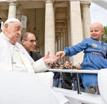








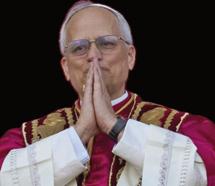

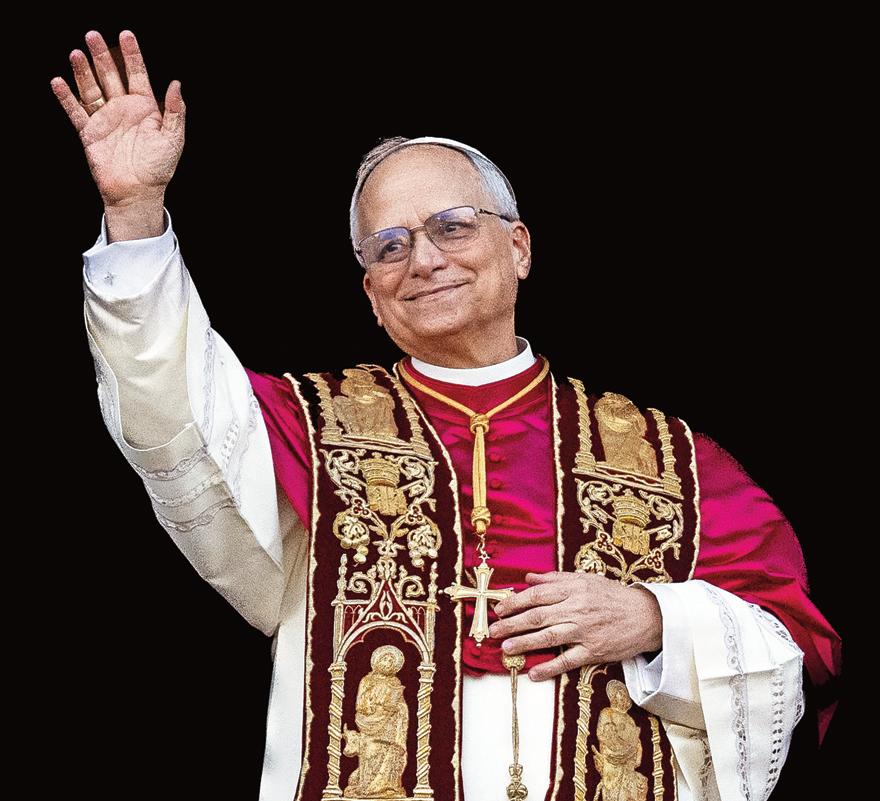







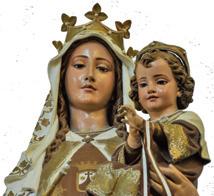





Bishop Alberto Rojas of San Bernardino Diocese, US issued a statement on Tuesday freeing the faithful from the obligation to attend Sunday Mass, after two Catholic parishes in his diocese were raided by Immigration agents. Multiple people were detained in the car park of St Adelaide Church in Highland, California.
The director of communications for the Diocese of San Bernardino, John Andrews, said those detained did not work for the parish nor were they parishioners. However, he reported that one male parishioner was taken into custody at Our Lady of Lourdes Church in Montclair on June 20.
In a July 8 message to the faithful, Bishop Rojas wrote that "in light of the pastoral needs of our diocese and the concerns expressed by many of our brothers and sisters regarding fears of attending Mass due to potential immigration enforcement actions by civil authorities," he would use his authority under canon law to dispense the obligation from those "who, due to genuine fear of immigration enforcement actions, are unable to attend Sunday Mass or Masses on holy days of obligation."
Bishop Rojas cited the Code of Canon Law, Canon 87, Paragraph 1, which states: "A diocesan bishop, whenever he judges that it
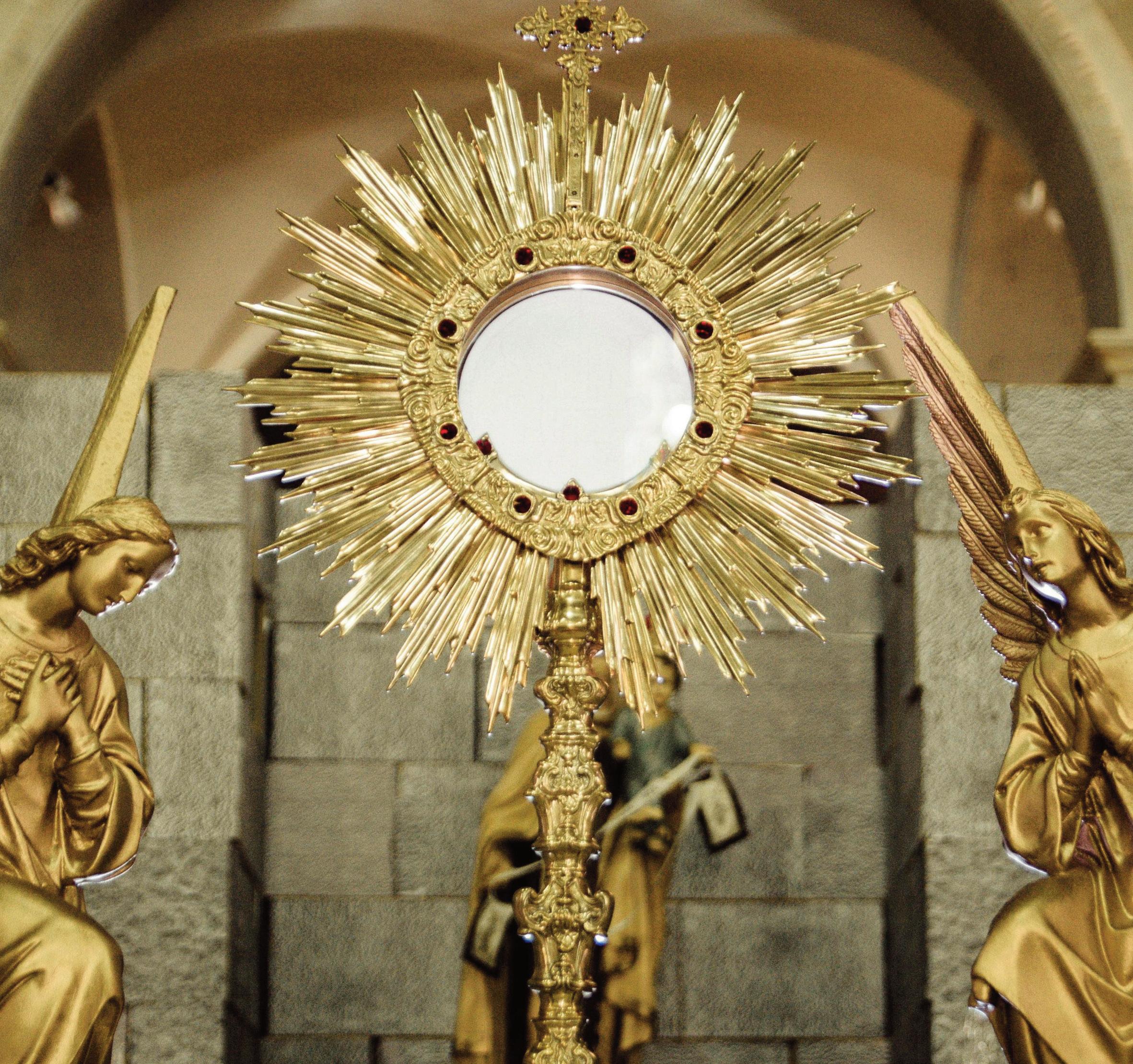
rcsouthwark.co.uk
contributes to their spiritual good, is able to dispense the faithful from universal and particular disciplinary laws issued for his territory or his subjects by the supreme authority of the Church."
He added that those dispensed from their obligation should "maintain their spiritual communion with Christ and His Church," through other means such as prayer, spiritual reading, or watching a livestreamed or broadcast Mass.
In May, the Diocese of Nashville, Tennessee, reminded the faithful that those with sincerely held fear about their well-being during immigration enforcement efforts are not required to attend Sunday Mass according to the church's own teaching and canon law, but did not issue a formal dispensation.
The Trump administration rescinded in January a policy preventing immigration arrests at "sensitive locations," including houses of worship, schools and hospitals. The previous policy had exceptions for public safety or national security threats.
The move, which was criticized by the US bishops' conference, was part of the Trump administration's effort to step up deportations.
The importance of Eucharistic Adoration cannot be overstated
Canon Michael Branch shares his love of Eucharistic adoration and his desire that everyone discover the Lord Jesus who is truly present in the Most Holy Sacrament of the Eucharist
Canon Michael said it is so important for us to spend time with the Lord Jesus in adoration, because “like any relationship, any friendship, it is so important that you spend time with that person”.
As a priest, Canon Michael said, his “one great desire” is for “the whole world to discover that Jesus is truly present in the Most Holy Sacrament”.
It was in Eucharistic adoration where Canon Michael felt the Lord calling him to the priesthood.
Recognising “we all have busy lives”, Canon Michael said we all still “need to make time before the Eucharist in Eucharistic adoration”. Canon Michael said “Eucharistic adoration isn’t an optional extra, it’s an absolute must”.

Canon Michael said “I can’t emphasise enough, I can’t encourage you more to grow in your belief in the real presence of Jesus Christ”. He said “this is the best way to invest your time”.
In Eucharistic adoration, “all of life’s problems”, Canon Michael said, “will eventually dissolve away” and “you will become the person who the Lord has really called you to be”.

plymouth-diocese.org.uk
“The virtue of hope responds to the aspiration of happiness which God has placed in the heart of every man.”
I was asked to offer a few words about ‘being a seminarian’. That shouldn’t be too difficult as I’ve been a seminarian for almost three years now, and I ought to know a thing or two about it. I could say a bit about our routine here at Allen Hall Seminary in London; about our daily cycle of prayers and classes and our regular pastoral work. Given however that in this Jubilee Year we are all Pilgrims of Hope, and that this month I will be travelling to Rome with my confreres for the Jubilee of Seminarians, I thought it might be more apposite to say a little about hope in the life of a seminarian.
It is always a good policy to check what the Catechism of the Catholic Church has to say on any subject before you start to write about it. About hope we are told that it is, “the confident expectation of divine blessing and the beatific vision of God”. And that, “the virtue of hope responds to the aspiration of happiness which God has placed in the heart of every man.” Hope then is about looking forwards to future happiness, and while in the normal run of things we can have forlorn hopes, the kinds of hope that don’t really expect to be fulfilled, Christian Hope, because it goes hand in hand with Faith and Love, allows us to enjoy an overture of our future happiness in the present.
Being a seminarian of course involves a lot of looking forwards. The time from my arrival at Allen Hall to my eventually being ordained a priest will be about seven years. Seven years of looking forwards in eager anticipation to a life that I can’t wait to begin. Moreover, if the celibate priesthood can be properly understood as a special kind of marriage, with the Church as your bride, then seminary might be likened to a long engagement. Jacob had to labour for fourteen years in the sheepfolds of Laban before he could finally marry the love of his life Rachel, so Allen Hall is a cinch in comparison.
There is a tension that comes with hope. Obviously you look forward to ordination as your goal, but then priests will often say to me, “don’t wish this time away”, and there is clearly a wisdom to that. If I want to be a priest so

badly that I don’t value this time of preparation, then am I really wanting the right thing? My calling, like everyone else’s, is a particular rendering of the imitation of Christ, but that doesn’t begin when a bishop (please God that we in Plymouth have a bishop by then), lays his hands on my head. I can be
attending to the Father’s will this very day and hour and minute. So while we are all permitted a little angst now and then, the life of a seminarian should be as happy as it is hopeful. After all, Christ has already achieved all that needs to be achieved, and there are no ‘ifs and buts’ for us to fret over, there is only, “Follow me.”
A final word from the letter to the Hebrews: “We have this sure and steadfast anchor for the soul, a hope that enters into the inner shrine behind the curtain, where Jesus has gone as a forerunner on our behalf, having become a high priest for ever after the order of Melchizedek.”
The Requiem Mass for Liverpool FC player Diogo Jota, 28, and his brother, André Silva, 25, was held on Saturday at the Igreja Matriz de Gondomar church in Portugal, on Saturday 5th July.
The brothers died in a car accident on Thursday, after a tyre of the car they were travelling in blew out.
Just eleven days before, Diogo had married his childhood sweetheart, Rute Cardoso, in a Catholic ceremony at the Church dedicated Our Lady of Lapa (Igreja da Lapa) in his home city of Porto. The couple had three young children.
Wearling a white t-shirt, Rute touched her husband's coffin as she led mourners outside the church.
The funeral was attended by Jota's Liverpool team mates, who carried floral tributes in the shape of team shirts, decorated with player numbers '20' and '30' for Jota and Silva respectively.

Former Liverpool manager Jürgen Klopp, wrote: "This is a moment where I struggle. There must be a bigger purpose, but I can't see it. We will miss you so much. All my prayers, thoughts and strength to Rute, the kids, the family, the friends and everyone who loved them."
Parish priest Father Jose Manuel Macedo said: "We share the pain at this time, as well as the hope of the believers."
Archbishop John Sherrington said he was "truly shocked and saddened to hear the heartbreaking news about Liverpool player Diogo
and his brother Andre
Our thoughts and prayers are with his wife, children, family, friends and the whole community."
Dan Sobey
We’ve always loved a good weekend city break. Pre-Covid, we’d manage at least one or two a year—easy little getaways with big impact. Cramming in a few full-on days of foreign culture was always a real treat, and while we were never gone long, we always came back feeling somehow renewed.
Since Covid, we’ve still travelled—done longer trips abroad, had weekends away—but not a proper city break. This year, we felt the call to bring that ritual back. Lisa gifted me a Christmas trip—and top of the list was Berlin.
It felt timely. Even symbolic.
Just 10 days before we flew out, the UK marked 80 years since VE Day. And the week of May 12–18 was Mental Health Awareness Week, themed around community—how connection holds us together, and isolation breaks us down. I’d actually been invited to deliver a presentation on exactly that—Community in the Workplace and its Impact on Mental Health—the day before we left.
So those threads—war, peace, mental health, community—were already weaving themselves through my thoughts as we touched down in Berlin.
Now, Plymouth doesn’t have its own airport, so we flew from Bristol—just a couple of hours up the road. With smooth parking, easy transfers, and the famously efficient German rail network, we were from tarmac to hotel in no time. So far, so smooth.
I’ve always considered myself a student of history—or at least, a curious reader. I’ve read plenty about Germany, about World War II, the Cold War. Our daughter recently won a school trip to Auschwitz as part of her A-level History course, which reignited discussions at home about “all that stuff.”
But being in Berlin shook me.
Because what I hadn’t really grasped—what hit me right in the chest—was what came after.
The psychological aftermath. The division of a nation. The splitting of cities, communities, and even families. The invisible scars on a generation’s mental health.
Everyone knows about East and West Berlin. The Wall. The USSR versus the Allies. But standing where that wall once cut through neighbourhoods like a scar, it becomes more than a political memory—it becomes personal. Lisa and I, usually laughing our way through every street and silly sign, both fell silent. There was a coldness. Not in the weather (but it was raining!)—but in the story. The history that haunted the air. I found my hand reaching for hers—some warmth, some grounding in the face of this stark reality.
One of the most impactful parts of our trip was visiting the Berlin-Hohenschönhausen Memorial, a former East German Stasi prison. Lisa had heard about it from someone in her fitness class—a Berliner now living in Plymouth—who recommended it as a place to really feel what life had been like under East German rule.
Our guide was a former inmate. That changes everything.
The stories weren’t just about physical confinement. They were about psychological warfare. Isolation. Manipulation. Silence. The slow, methodical breaking down of people. No bruises needed—just separation from loved ones, the absence of time, the erasure of self. And even the guards were under constant surveillance. Orwell’s 1984 no longer felt like fiction—it felt like biography.
As someone who thrives in the open air— running thru the green spaces of Plymouth, paddling off of the Devon and Cornish coast, moving freely—the thought of being locked in that system twisted my gut. Every fibre of me ached to run. To breathe. To shout. And then… to be grateful. For freedom. For choice. For connection.
And it made me think—we still battle these forces today. Not with barbed wire, but in our minds. We still fall into isolation. Still feel

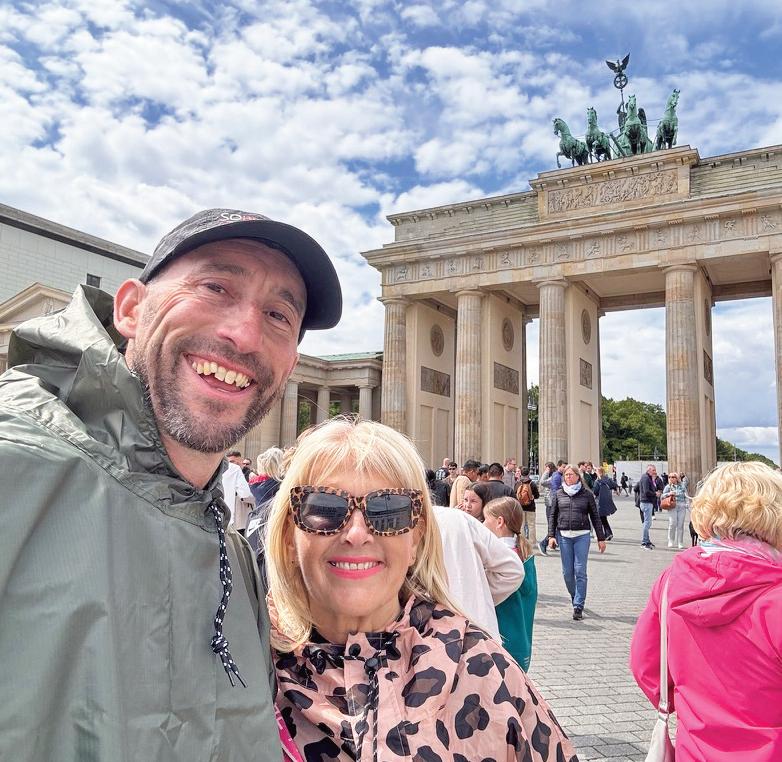
watched, judged, trapped. We still cut ourselves off—through fear, shame, self-doubt. The modern version of the wall is often invisible… but no less real.
That’s why community matters. That’s why we need each other.
Because disconnection breaks us. Community saves us.
In contrast to that darkness, I found a pocket of peace in the quiet grandeur of Berlin Cathedral, where I went to Mass. It was still, sacred, and soothing. A reminder that even in a city with a painful past, there are spaces carved out for hope, healing, and reflection. It felt important, as a Catholic, to pause in that space—to pray, to connect, to honour the peace within the storm.
As we wandered further, we stood before the Brandenburg Gate—Berlin’s iconic monument.
Its history is as turbulent as the city’s. Built as a symbol of peace, it was later used for military parades and propaganda, then sealed off during the Cold War, trapped in the no-man’s land of division. The Quadriga—the statue atop the gate—was once seized by Napoleon and taken to Paris, then reclaimed and returned. Over time, it’s represented everything from imperial might to Nazi power to Soviet resistance.
But now? Now, to my eyes, it represents something new. Something whole.
It stands as a beacon of unity. Of healing. Of a city—and a people—stitched back together, embracing their diversity. The square around
it buzzes with life. Locals, tourists, musicians, activists, lovers. Different. Equal. Together.
It’s no longer a gateway of conquest. It’s a gateway of community.
And maybe that’s what the Fool carries forward.
Not naivety, but hope. Not perfection, but courage. A willingness to keep walking—to keep stepping forward, even when the road is heavy with history.
That’s what this trip felt like. A gentle reboot. A reawakening. A pilgrimage into adventure, reflection, and reconnection.
I may have gone as a tourist, but I came back as a pilgrim—with new eyes, a fuller heart, and a deeper reminder:
Healing doesn’t happen in isolation. It happens in community. In shared stories. In silent prayers. In brave conversations. In weekends away that stir the soul. Berlin reminded me that we all carry scars— some visible, some silent. But we also carry hope. And we carry each other.
So here’s to walking the Fool’s path with courage.
To rebuilding connection—within ourselves, with each other, and with something greater.
To the quiet places—cathedrals, coffee shops, candlelit corners—where the soul remembers it’s never truly alone.
Step by step, the pilgrimage continues.


You can use both sets of clues to solve the puzzle: the solutions are the same. CRYPTIC Across
7 Pool, outside Jerusalem, is a store of grain by morning (6)
8 Quiet after drink by the river in the Syrian city (6)
9 Felix's wife needs a doctor, getting sick in America (8)
10 Police officer close to Egypt reportedly finds a Christian sect member (4)
11 Pulls apart sick pun? (7)
14 Biblical prophetess's name for a Scottish town (5)
15 Midlands city cricket captain loses toss in the end (5)
17 One's reflective after transposing Yeats into the church (4-3)
21 Short recording following the appearance of old poet (4)
22 In Persia he, curiously, becomes a Jew (8)
24 Dangerous plant genus, dock, making a comeback in the borders of Asia (6)
25 Partly responsible, ambushing Canaan town (6) CRYPTIC Down
1 Stories he tells sending up type of transport (4)
2 Road on which social climber turned up displaying ornamental shrub (6)
3 A boy king, son of Eliiphaz (6)
4 Native American's upset losing ring, one coming from Indonesia (5)
5 Clergyman's study down under is being curtailed (6)
6 Record at a pub, one New York's supporting, being a January fixture (8)
12 'Birth of a Nation's only half on – at six on telly, either side – at Christmas (8)
13 Top South Australian carnivore's kind of pouch (3)
16 Report Viking retreat in a valley near Jerusalem (6)
18 One killed in Susa is a boy found upset within Ionia's bounds (6)
19 Guard hurled the first of lances to be commandeered (6)
20 ...Lance earl used to break up joust (5)
23 Biblical country's macho overthrow (4) QUICK Across
7 Underground pool; once a major water source for Jerusalem (6)
8 Second city of Syria (6)
9 Wife of procurator Felix who heard Paul's case (8)
10 Member of a Christian sect; one descended from the ancient Egyptians (4)
11 Pulls apart; works out (7)
14 UN Secretary General 1997-2006; Scottish town (5)
15 Add fuel to: keep (a fire) going (5)
17 Middle-of-the-road illumination (4-3)
21 Roman poet remembered for his elegiac verses on love (43 BC - AD 17) (4)
22 Member of a strict sect of Judaism (8)

13 Fluid container; bag (3)
16 Valley separating Temple Mount from the Mount of Olives (6)
24 Genus of the family commonly known as belladonna or deadly nightshade (6)
25 Town of Canaan where Jehu killed Ahaziah (6) QUICK Down
1 Fabricator of the truth; perjurer (4)
2 Japanese dwarf trees and shrubs (6)
3 Grandson of Esau and son of Eliphaz (6)
4 Son of Japheth, father of people who lived in Greece and Asia Minor (5)
5 Position of an ordinand on successful completion of training (6)
6 Day after Twelfth Night (8)
12 Theological doctrine that Jesus Christ had no human father (8)
18 Notable among the enemies killed by the Jews at Ahasuerus' citadel in Susa (6)
19 Protect; ward off (6)
20 Assegai, for example (5)
23 Biblical country in south-west Asia to the east of the Tigris River (4)